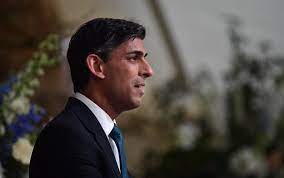Fraser Nelson
Claire Coutinho didn’t need a career in politics. She was on the banking fast-track, a maths graduate snapped up by Merrill Lynch and on the kind of conveyor belt that guarantees a comfortable life. She ditched it for public service, first working for charity and quickly impressing Rishi Sunak, who hired her as an adviser. He couldn’t let her go when she entered Parliament at the last election, and kept her as his parliamentary aide. Her promotion to Energy Secretary yesterday is one of the few cards, perhaps the only real card, he had to play in seeking to energise his Cabinet.
Things are looking bleak. The polls are not shifting and Isaac Levido, the chief Tory strategist, has told ministers that they may stay 20 points behind for the rest of the year. Anyone bold enough to bet on a Sunak majority can find odds of nine-to-one. But it would be odd to change course now, given how often the Conservatives changed face in the past year. So Sunak’s strategy is to keep on his current trajectory, but with more oomph. As a Tracey Emin-designed neon sign in No?10 used to say: “More passion.”
Ben Wallace was liked by the military and loved by Tory members. Losing him deprives the Cabinet of flair and heft. He spotted the Ukraine crisis earlier than any of his European counterparts and was pivotal to striking a pre-Nato membership alliance with Sweden. Such judgment showed Britain on the front foot on foreign affairs.
There was no direct replacement to be had. His successor, Grant Shapps, will likely be used for general crisis management as Michael “fireman” Fallon once was. Someone who, if you hear their voice on the radio, you know the Government is in trouble. But the promotion of Coutinho could make more impact. Like Sunak, she’s wary of climate zealotry and mindful of the cost. She’s energetic, smart, a strong communicator and might be able to sell Sunak better than he can. So far, she has concentrated on getting to know her constituents, who elected her four years ago. She has set up The Friendship Project to tackle loneliness in East Surrey, for example, and raised £30,000 for it. A lesser MP in such a rock-solid safe seat would have focused on Westminster, but she’s cut from a different cloth. Her politics is more practical, especially on the social justice agenda.
The biggest social justice problem for the Tories is, of course, welfare. The progress made under Iain Duncan Smith was washed away by the lockdowns. Official figures slipped out two weeks ago show 5.4 million now on out-of-work benefits. A fifth of working-age people in Liverpool and Birmingham are on such benefits, as is a quarter of Middlesbrough and Blackpool. The economic and social damage being inflicted on these cities – at vast cost to the taxpayer – makes this the biggest scandal in politics. But a quiet one, because just 1.4 million are in the official unemployment figures (sickness benefit etc, doesn’t count).
Coutinho was, briefly, working on this as a welfare minister, asking if Tory welfare reform could be rekindled. The party did this once, so why not again? Perhaps the most alarming statistic in British government right now is a forecast that the disability benefit caseload will rise by 25 per cent over four years, to more than seven million. No wonder the UK growth forecasts are so grim for so long. What country can ever prosper if such a large chunk of its people are economically decommissioned? But here, too, Sunak is moving. Mel Stride, the Work and Pensions Secretary, will next week start to reform the assessments for sickness benefit, seeking to stem the flow of claimants from 5,000 a day (twice what it was pre-lockdown). Four in five of those now assessed under Universal Credit are judged not fit for work – a ratio that has doubled since Iain Duncan Smith’s day. Are we really so sure that so many are unable to do any work at all, in a homeworking era, in a country facing a worker shortage crisis? Are those with mental health complaints being written off instead of helped?
Asking such questions, and updating the 12-year-old system, is harder than it seems. Welfare reform is tough, arguably the toughest task in politics. Department for Work and Pensions workless payments now govern a population the size of Norway, so mistakes here can hurt millions of the poorest people in the country. This is perhaps why Labour is so coy about the whole agenda. Culturally, the party is queasy about pointing to an excess of benefit claimants, especially if a worker shortage crisis means there is no recession to blame. If Keir Starmer becomes prime minister, he’d have only two options: to accept economic stagnation or to start a welfare reform process that even the Tories have been unable to face going through again. For too long, it has suited both parties to pretend that the post-lockdown welfare crisis isn’t happening. At least Stride is about to try and, if he and the Prime Minister move fast, they may see some results. If not, then the doom graphs will be used by Labour to say that Toryism promises years of social failure.
As the election approaches, one of Sunak’s biggest challenges will be to explain what Conservatism is: why it has worked, why it’s better than the alternative. The results, sadly, don’t really speak for themselves. Sunak thought furlough would – for all its huge cost – minimise economic scarring because the Tories had learnt how to move people from welfare to into work. Instead, Britain is now the only major country to have failed to rebuild our workforce back to pre-pandemic levels. Coutinho’s promotion means there’s someone else around the Cabinet table who thinks the next big heave at welfare reform will be vital. It would be political suicide to talk about a relaunch, especially for a man not even a year into the job. But what we’re seeing now is Sunak choosing his last few pre-election battles, gathering and promoting his closest allies and getting ready for his final push. The Conservatives have faced worse odds. David Cameron was given a 0.5 per cent chance of a majority by Populus ahead of the 2015 election, so miracles can happen. Sunak doesn’t have much of an option but to pray for one now.
The Telegraph







